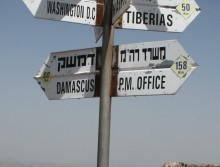
Syria’s capital city and the terrorists therein aren’t that far from Israel. Photo: Signpost showing distance between Israel, Syria. Illustrative. By Joshua Spurlock
It took 36-years, but a high-profile Hezbollah terrorist has finally paid the final price for his role in the deaths of five Israelis—including two children—in a blow considered to significantly hurt Hezbollah, according to an Israeli expert. Samir Kuntar, given the title of “Dean of liberated detainees from Israeli prisons” by Hezbollah, was killed on Saturday in an airstrike according to the Hezbollah news group Al-Manar.
The report accused Israel of carrying out the attack, saying four long-range missiles demolished the building where Kuntar was located. Making the strike even more noteworthy is that it took place in a town on the outskirts of the Syrian capital city of Damascus. Following the death of Kuntar, rockets were launched from Lebanon at Israel, presumably in response. Israeli artillery returned fire according to the IDF Spokesperson’s Twitter feed. Whether or not that ends the response or whether Hezbollah retaliates further remains to be seen.
Dr. Moshe Maoz, Dept. of Islamic and Middle Eastern Studies at The Hebrew University of Jerusalem, told The Mideast Update in an email that the death of Kuntar hurts Hezbollah “very much”, noting specifically that it harms the terror group’s “prestige.”
Kuntar had been something of a victory trophy for Hezbollah, who obtained his release from an Israeli prison in 2008 in exchange for the bodies of two Israeli soldiers Hezbollah killed in the Second Lebanon War in 2006. In addition, Kuntar was a hero for Hezbollah for his role in a terror attack in northern Israel in 1979. The Israeli Ministry of Foreign Affairs (MFA), in a report on Kuntar released in 2008 on their website, said the terrorist was part of a cell that kidnapped an Israeli father and his daughter, murdering both when the cell was caught by Israeli security forces.
As part of the terror attack, two Israeli police officers were killed and an Israeli toddler was suffocated as her mother tried to keep her hidden from the terror cell, according to the MFA report.
Because of Kuntar’s high profile, it was likely that Hezbollah would retaliate against Israel. But Dr. Maoz, in his email to The Mideast Update, said that the severity of the response would depend “on circumstances.” The rocket attack on Sunday may suffice, but previous targeted killings of Hezbollah terrorists has led the terror group to try and kill Israelis in response.
However, the terror group is believed to be deeply involved in the Syrian civil war on the part of their ally the Bashar al-Assad regime. That has tied up Hezbollah resources and manpower, thereby limiting their appetite for risking a war with Israel in a serious attack in response to Kuntar’s death. So it’s not surprising that in a Hebrew University press release quoting Dr. Maoz, the Israeli expert noted that whether or not to respond posed a “big dilemma” for Hezbollah.
(By Joshua Spurlock, www.themideastupdate.com, December 20,2015)
